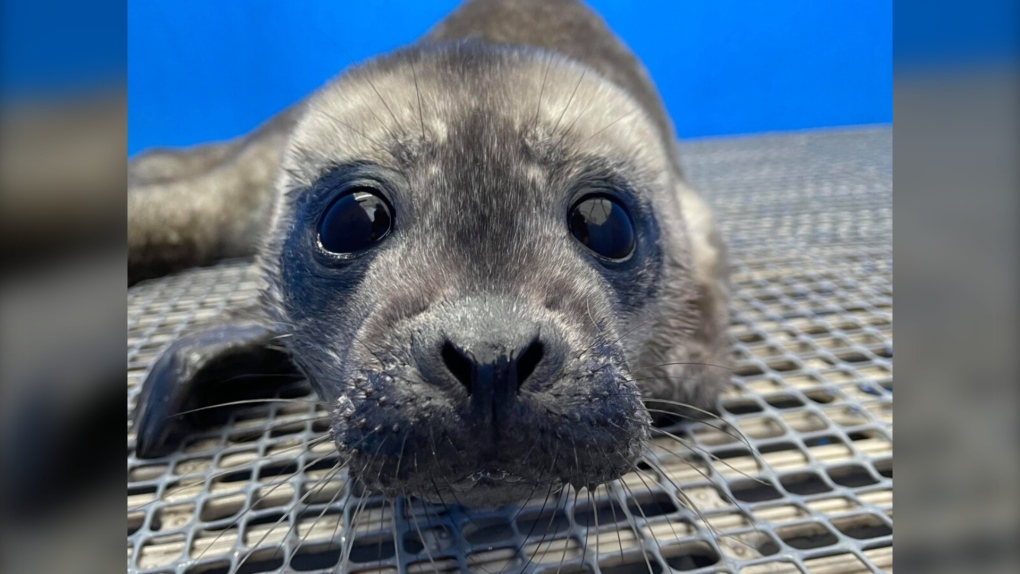'Not all pups on the beach need rescuing': Marine mammal rescue centre sees increase in human interference
 A harbour seal pup named Sushi is seen in this photo from the Vancouver Aquarium's Marine Mammal Rescue Centre
A harbour seal pup named Sushi is seen in this photo from the Vancouver Aquarium's Marine Mammal Rescue Centre
The Vancouver Aquarium's Marine Mammal Rescue Centre says it has seen an uptick in cases of "human interference" during this year's harbour seal pupping season, and it's reminding the public not to approach wild animals.
"We understand why someone might be inclined to approach seal pups – they look adorable and can appear abandoned when seen without mom – but not all pups on the beach need rescuing," said Lindsaye Akhurst, the centre's manager, in a news release.
"The best thing you can do for any marine mammal you suspect needs help is to keep people and pets back and to call the VAMMRC," Akhurst added.
As of Thursday, the rescue centre had admitted 14 patients so far this season. The centre asks the people who report seal pups to name the animals as they enter its care.
If the naming process "stalls," centre staff ask people to choose a name based on what they last ate.
Among the seals in the centre's care currently are "Sushi," "Scrambled Egg," "Popcorn," and "Cauliflower Jack."
The rescue centre employs a team of veterinarians and volunteers and is equipped to rehabilitate seals, sea lions, sea otters, sea turtles and small cetaceans, such as harbour porpoises, at its facility at the aquarium.
It also responds to off-site emergencies, rescuing more than 100 animals each year.
“This is an exciting time of year, and it can be thrilling to see marine mammals in the wild, but we also need to ensure we are not interfering with a marine mammal who may be exhibiting normal behaviour," Akhurst said. "We have noticed an alarming trend of patients being admitted to the VAMMRC due to human disturbance this year so far."
The centre is reminding anyone who sees a stranded marine mammal not to approach it. Instead, the centre asks the public to keep pets and people away and call either the centre at 604-258-7325 or the Fisheries and Oceans Canada incident reporting hotline at 800-465-4336.
CTVNews.ca Top Stories

From essential goods to common stocking stuffers, Trudeau offering Canadians temporary tax relief
Canadians will soon receive a temporary tax break on several items, along with a one-time $250 rebate, Prime Minister Justin Trudeau announced Thursday.
'It didn't sound good': Mother shares what her sons went through with walking pneumonia
A mother shares with CTVNews.ca her family's health scare as medical experts say cases of the disease and other respiratory illnesses have surged, filling up emergency departments nationwide.
Putin says Russia attacked Ukraine with a new missile that he claims the West can't stop
Russian President Vladimir Putin announced Thursday that Moscow has tested a new intermediate-range missile in a strike on Ukraine, and he warned that it could use the weapon against countries that have allowed Kyiv to use their missiles to strike Russia.
Service Canada holding back 85K passports amid Canada Post mail strike
Approximately 85,000 new passports are being held back by Service Canada, which stopped mailing them out a week before the nationwide Canada Post strike.
Manitoba RCMP issue Canada-wide warrant for Ontario semi-driver charged in deadly crash
Manitoba RCMP have issued a Canada-wide arrest warrant for the semi-driver involved in a crash that killed an eight-year-old girl and her mother.
Taylor Swift's motorcade spotted along Toronto's Gardiner Expressway
Taylor Swift is officially back in Toronto for round two. The popstar princess's motorcade was seen driving along the Gardiner Expressway on Tuesday afternoon, making its way to the downtown core ahead of night four of ‘The Eras Tour’ at the Rogers Centre.
Here's a list of items that will be GST/HST-free over the holidays
Canadians won’t have to pay GST on a selection of items this holiday season, the prime minister vowed on Thursday.
Mother charged after infant dies in midtown Toronto: police
The mother of an infant who died after being found at an apartment building in midtown Toronto on Wednesday has been charged with failing to provide the necessaries of life.
Trudeau says Canada would 'abide' by ICC arrest warrant for Israel PM Netanyahu
Prime Minister Justin Trudeau said Canada will 'abide' by an International Criminal Court (ICC) arrest warrant for Israeli Prime Minister Benjamin Netanyahu.
































